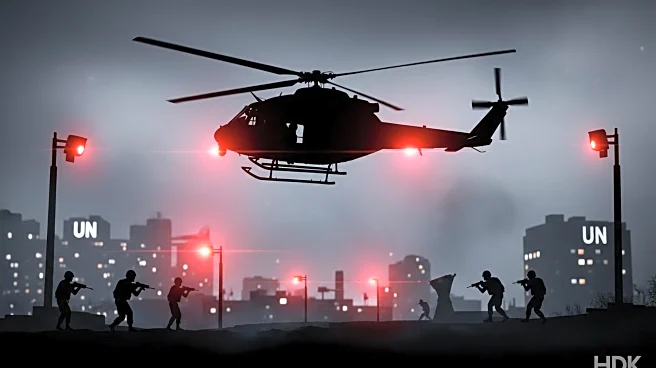What is the story about?
What's Happening?
On October 3, 1993, a mission by Task Force Ranger in Mogadishu, Somalia, turned into a prolonged battle after two Black Hawk helicopters were shot down. The operation, initially intended as a short raid to disrupt a meeting of warlord Mohammed Farrah Aidid's commanders, quickly escalated into chaos. U.S. forces, including Rangers and Delta operators, were split and under heavy fire, necessitating a rescue mission. The rescue was executed by a combined UN force, including Malaysian armored vehicles and Pakistani tanks, alongside the U.S. Army's 10th Mountain Division. Despite the secrecy of the raid, UN forces managed to assemble a relief column of nearly 100 vehicles, which included Malaysian APCs and Pakistani tanks. The rescue operation faced significant challenges, including RPG and machine-gun fire, but ultimately succeeded in reaching the crash sites and evacuating the wounded and dead.
Why It's Important?
The events of October 3-4, 1993, known as the Battle of Mogadishu, have had lasting impacts on U.S. military policy and international relations. The involvement of UN forces, particularly from Malaysia and Pakistan, was crucial in the successful rescue of American troops, highlighting the importance of international cooperation in military operations. The battle resulted in significant casualties, with 18 Americans killed and 84 wounded, alongside casualties among Malaysian and Pakistani forces. The operation's outcome influenced U.S. military strategy and engagement rules, emphasizing the need for armored support in urban combat scenarios. Additionally, the recognition of UN forces' contributions underscores the value of multinational efforts in peacekeeping and conflict resolution.
What's Next?
The legacy of the Battle of Mogadishu continues to influence military training and doctrine, particularly in urban warfare and international collaboration. The acknowledgment of UN forces' roles in the rescue operation may lead to further recognition and appreciation of international peacekeeping efforts. As military historians and veterans reflect on the events, there may be renewed discussions on the portrayal of such operations in media and popular culture, potentially leading to more accurate representations of multinational military efforts.
Beyond the Headlines
The Battle of Mogadishu and the subsequent rescue operation highlight the complexities of international military interventions and the challenges of coordinating multinational forces. The operation's portrayal in media, such as the film 'Black Hawk Down,' has often minimized the contributions of UN forces, leading to calls for more accurate historical accounts. The recognition of Malaysian and Pakistani troops' sacrifices serves as a reminder of the diverse contributions to global peacekeeping efforts and the importance of acknowledging all participants in military operations.















